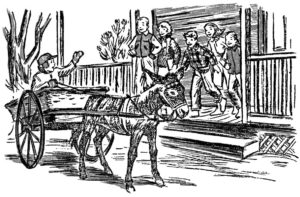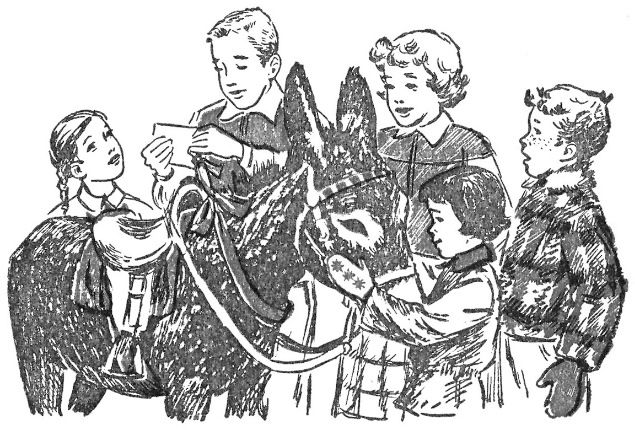Throughout their adventures, the Hollisters meet many animal friends. One of the most special animals they encounter is Domingo, a donkey who makes his first appearance in The Happy Hollisters at Mystery Mountain. Pete, Pam, Ricky, Holly, and especially Sue are so in love with the little donkey that their friends in New Mexico promise to send Domingo to live with them in Shoreham. He finally arrives a few books later, in The Happy Hollisters and The Trading Post Mystery. Along with a mysterious Christmas riddle attached to his halter, Domingo’s arrival raises another question: do donkeys actually make good pets?
In many areas, it is legal to keep a donkey as a pet, though certain restrictions, like property size, often apply. The Hollister family learns this the hard way, when they are told that their local Board of Health won’t allow them to keep Domingo—happily, this turns out to be just another one of Joey Brill’s mean pranks.
 Donkeys, which are sometimes also called burros, were domesticated 6,000 years ago, mainly in desert areas like ancient Mesopotamia. Originally used to transport people and goods, donkeys are known for being rugged, strong animals. Aside from their large ears, donkeys look very similar to horses, but are much smaller, just 36-48 inches tall and weighing around 400 pounds. This makes them manageable pets that can be trained to help with chores. In The Happy Hollisters and The Trading Post Mystery, for example, Domingo quickly becomes a productive member of the Hollister household by ferrying the kids to school, pulling a cart to deliver holiday packages for Mr. Hollister’s store, and even starring in a nativity scene! While they’re sometimes depicted as being unruly or unsophisticated, donkeys are actually gentle, loyal, and great pets for people with the means to care for them.
Donkeys, which are sometimes also called burros, were domesticated 6,000 years ago, mainly in desert areas like ancient Mesopotamia. Originally used to transport people and goods, donkeys are known for being rugged, strong animals. Aside from their large ears, donkeys look very similar to horses, but are much smaller, just 36-48 inches tall and weighing around 400 pounds. This makes them manageable pets that can be trained to help with chores. In The Happy Hollisters and The Trading Post Mystery, for example, Domingo quickly becomes a productive member of the Hollister household by ferrying the kids to school, pulling a cart to deliver holiday packages for Mr. Hollister’s store, and even starring in a nativity scene! While they’re sometimes depicted as being unruly or unsophisticated, donkeys are actually gentle, loyal, and great pets for people with the means to care for them.
The Hollister’s picturesque home in Shoreham has plenty of space, which means that it’s an ideal environment for donkeys like Domingo. Like horses, donkeys require space to roam and are happiest and healthiest when they have a farm-like habitat and lots of grass for grazing. In ancient times, donkeys were accustomed to walking many miles a day, which means that movement is still important for a healthy lifestyle. They can quickly become overweight if they don’t have the freedom to move around, which can cause dangerous health issues. They don’t need too much freedom, though—they’re known for being daring escape artists, so secure fencing is a must.
The Hollister children work hard to build a stall for Domingo in their garage, complete with lots of straw for bedding and plenty of hay to eat. Donkeys also enjoy snacking on dried sugar beet pulp, carrots, apples, and bananas. Donkeys do have some dietary restrictions and should never eat bread, chicken feed, or pellet pet food.
Even though Will Wilson, one of Shoreham’s bullies, calls Domingo a “mangy old burro,” donkeys can be clean pets with proper and frequent care. They need regular care from an equine veterinarian for things like deworming and teeth examinations. Lice infestation is an especially common issue for donkeys, so delousing medication is required every few weeks to keep a pet donkey healthy and comfortable. Like horses, they may require the attention of a farrier, an equine specialist who can trim their hooves and provide other basic care.
As the Hollisters learn in The Happy Hollisters and The Trading Post Mystery, owning a donkey takes some research, plus a lot of care and attention, but it can be a very rewarding experience. Even if your family doesn’t have the means or space to care for a pet donkey, reading about the Hollisters’ adventures with Domingo can be a swell way to enjoy the fun without the work and commitment!
By Libby Svenson Kennedy
Sources:
Research notes, Andrew Svenson Archives of The Hollister Family Properties Trust

